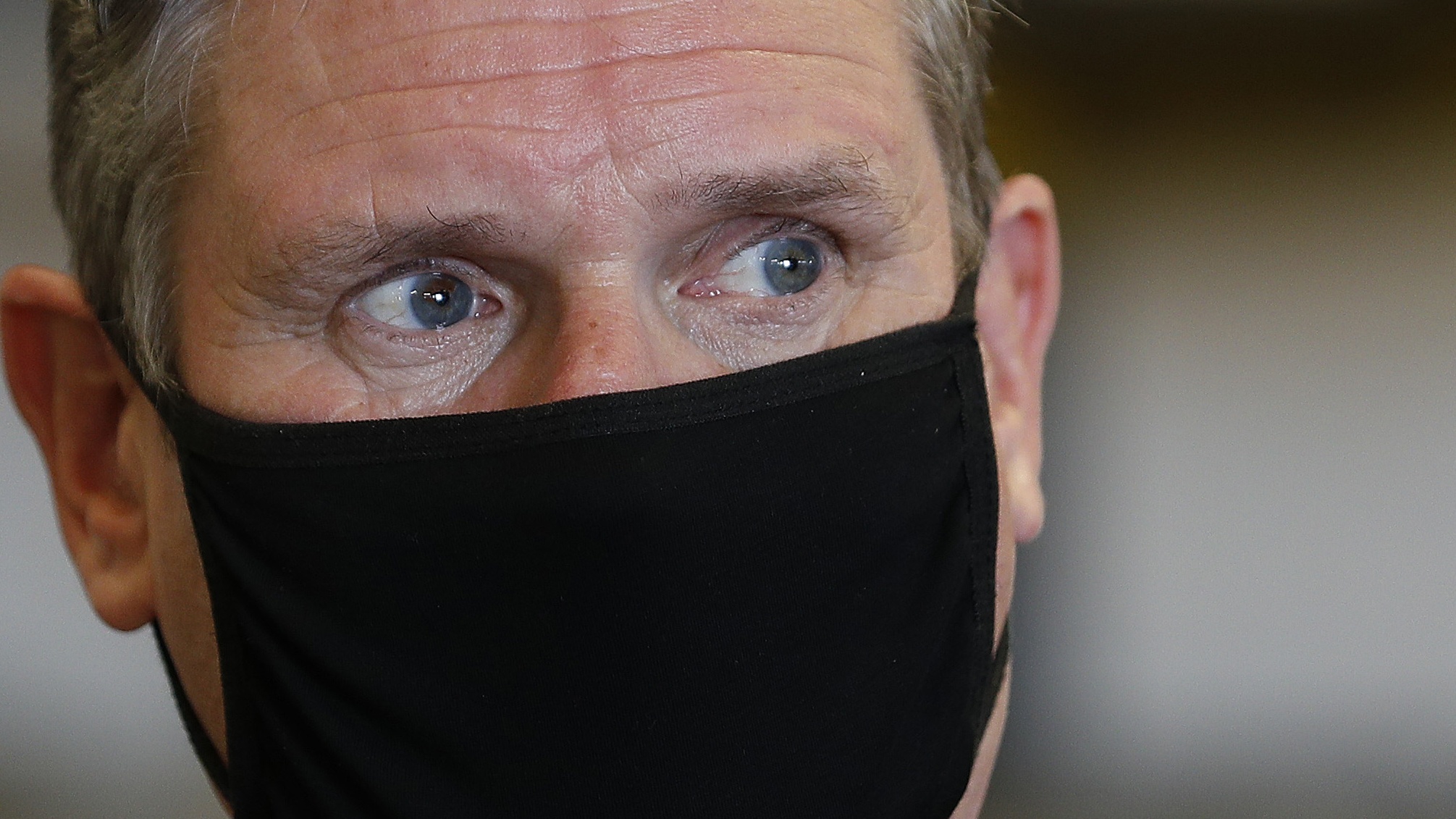Debate: is Keir Starmer making Labour great again - or letting Boris Johnson off the hook?
Labour leader’s pitch to competence and trust sees his party gaining on Tories in the polls

A free daily email with the biggest news stories of the day – and the best features from TheWeek.com
You are now subscribed
Your newsletter sign-up was successful
Keir Starmer had a long list of headaches when he arrived for his first day as leader of the opposition back in early April.
With Labour still licking its wounds after its worst election defeat since 1935, and the coronavirus crisis escalating, how Starmer would set about rebuilding his party was a key question.
But five months on, Starmer’s star appears to be rising, with Labour level with the Conservatives in recent polling. So should Boris Johnson be worried?
The Week
Escape your echo chamber. Get the facts behind the news, plus analysis from multiple perspectives.

Sign up for The Week's Free Newsletters
From our morning news briefing to a weekly Good News Newsletter, get the best of The Week delivered directly to your inbox.
From our morning news briefing to a weekly Good News Newsletter, get the best of The Week delivered directly to your inbox.
‘Make Labour Great Again’
As Politico’s chief UK correspondent Charlie Cooper writes, the challenge facing Starmer is a “surprisingly Trumpian mission: (Re)build the wall”.
Having seen Labour’s red wall electoral stronghold decimated in the December vote, “winning back those voters is mission critical if Starmer is to stand any chance of becoming Britain’s next prime minister” - and “his team has had them firmly in mind”.
The party’s post-mortem following the election found that along with issues including Brexit and voters’ doubts about Jeremy Corbyn, the wipeout was the “culmination of a decade or more in which old party loyalties based on class have loosened and given way to cultural divides on identity”, Cooper adds.
A free daily email with the biggest news stories of the day – and the best features from TheWeek.com
So “there’s some irony” in critics accusing Starmer of being “too timid” and show a lack of “revolutionary instincts”, says ex-chief prosecutor Nazir Afzal, who worked under the Labour leader when he was director of public prosecutions.
Instead, Afzal writes in an article for HuffPost, Starmer “is currently pursuing the most radical idea in politics” - rebuilding trust.
This push appears to be bearing fruit. The New Statesman reports that polling shows “more Brits now view Labour as competent and capable” then under Corbyn.
“A notable trend for Labour since Starmer became leader has been a steady drop in the number of voters with an unfavourable opinion about the party,” the magazine says. “In the run-up to the 2019 election, nearly half of Brits viewed Labour negatively. That has now fallen to 39%.”
This is not lost on Starmer’s inner circle, one of whom told Politico’s Cooper that “one of their top priorities… has been the task of ‘establishing Keir”.
Cooper points to opinion articles written by Starmer for right-wing newspapers, and the Labour leader’s appeals to patriotism, as examples of this bid to “put down markers about his political and moral values”.
As the PR offensive gathers pace, the New Statesman says that “there’s little question that Keir Starmer has impressed as a formidable leader of the opposition”.
But is he tough enough?
One criticism levelled at Starmer is that he has not been forceful enough in his attacks on Johnson’s government during the coronavirus pandemic.
In an article in The Guardian in April, Tony Blair’s former spin doctor Alistair Campbell wrote that Starmer should “show no mercy” in exposing mistakes made by government ministers.
Calling on the Labour leader to “take the gloves off”, Campbell said “it has been noticeable how rarely, at government briefings and interviews, questions have been framed by things Labour has said or done; that must change”.
Former shadow chancellor John McDonnell has also criticised his boss from the backbenches, tweeting that “it’s not opposition for opposition’s sake to call out [government’s] failure to pursue effective test & track programme & supply basic protection to front line staff & to neglect support for care homes & care workers”.
This is at odds with Starmer’s calls for constructive opposition, although he has become more critical of the government’s handling of the coronavirus pandemic. In an article for The Guardian in early August, he wrote: “We accept that no one could have handled coronavirus perfectly.
“But the truth is that the government has been too slow to act throughout this crisis – too slow into lockdown, too slow on testing and too slow getting PPE to front-line workers.”
What are the upcoming challenges?
As has become the norm for the Labour Party in recent years, many of Starmer’s most pressing problems have originated among his own MPs.
In July, the party agreed in the High Court to pay undisclosed six-figure settlements for making “false and defamatory” comments about ex-employees who spoke out last year in a BBC Panorama documentary titled Is Labour Anti-Semitic?.
Corbyn and his followers, including Unite leader Len McCluskey, attacked the payout, with the Daily Mail warning that “the move could reignite factional infighting with the party’s hard-left element”.
The Spectator’s Isabel Hardman argues that “Labour MPs who weren't Corbyn fans (which was most of them) are so relieved that Starmer has taken over that they are willing to forgive a great deal”.
But “what does worry supportive MPs is that Starmer’s main pitch is one of competence”, she adds. “At the moment, they say, that’s perfect as he’s responding to the government’s handling of the coronavirus epidemic.”
But “one currently loyal MP” told Hardman that “being self-evidently competent is necessary but not sufficient”.
“You need to be able to set some fires too,” said the insider. “It’s pretty rare for people just to vote for competence. They also need to vote for something they feel enthusiastic about.”
Joe Evans is the world news editor at TheWeek.co.uk. He joined the team in 2019 and held roles including deputy news editor and acting news editor before moving into his current position in early 2021. He is a regular panellist on The Week Unwrapped podcast, discussing politics and foreign affairs.
Before joining The Week, he worked as a freelance journalist covering the UK and Ireland for German newspapers and magazines. A series of features on Brexit and the Irish border got him nominated for the Hostwriter Prize in 2019. Prior to settling down in London, he lived and worked in Cambodia, where he ran communications for a non-governmental organisation and worked as a journalist covering Southeast Asia. He has a master’s degree in journalism from City, University of London, and before that studied English Literature at the University of Manchester.
-
 The ‘ravenous’ demand for Cornish minerals
The ‘ravenous’ demand for Cornish mineralsUnder the Radar Growing need for critical minerals to power tech has intensified ‘appetite’ for lithium, which could be a ‘huge boon’ for local economy
-
 Why are election experts taking Trump’s midterm threats seriously?
Why are election experts taking Trump’s midterm threats seriously?IN THE SPOTLIGHT As the president muses about polling place deployments and a centralized electoral system aimed at one-party control, lawmakers are taking this administration at its word
-
 ‘Restaurateurs have become millionaires’
‘Restaurateurs have become millionaires’Instant Opinion Opinion, comment and editorials of the day
-
 How corrupt is the UK?
How corrupt is the UK?The Explainer Decline in standards ‘risks becoming a defining feature of our political culture’ as Britain falls to lowest ever score on global index
-
 Will Peter Mandelson and Andrew testify to US Congress?
Will Peter Mandelson and Andrew testify to US Congress?Today's Big Question Could political pressure overcome legal obstacles and force either man to give evidence over their relationship with Jeffrey Epstein?
-
 How long can Keir Starmer last as Labour leader?
How long can Keir Starmer last as Labour leader?Today's Big Question Pathway to a coup ‘still unclear’ even as potential challengers begin manoeuvring into position
-
 What is at stake for Starmer in China?
What is at stake for Starmer in China?Today’s Big Question The British PM will have to ‘play it tough’ to achieve ‘substantive’ outcomes, while China looks to draw Britain away from US influence
-
 Can Starmer continue to walk the Trump tightrope?
Can Starmer continue to walk the Trump tightrope?Today's Big Question PM condemns US tariff threat but is less confrontational than some European allies
-
 The high street: Britain’s next political battleground?
The high street: Britain’s next political battleground?In the Spotlight Mass closure of shops and influx of organised crime are fuelling voter anger, and offer an opening for Reform UK
-
 Alaa Abd el-Fattah: should Egyptian dissident be stripped of UK citizenship?
Alaa Abd el-Fattah: should Egyptian dissident be stripped of UK citizenship?Today's Big Question Resurfaced social media posts appear to show the democracy activist calling for the killing of Zionists and police
-
 Biggest political break-ups and make-ups of 2025
Biggest political break-ups and make-ups of 2025The Explainer From Trump and Musk to the UK and the EU, Christmas wouldn’t be Christmas without a round-up of the year’s relationship drama